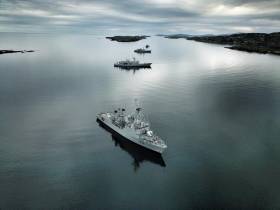Displaying items by tag: Pay Review
It is expected that the Government will announce a new review of pay for up to 2,500 members of the Defence Forces with specialist or technical skills.
The move, writes The Irish Times, will be in addition to the proposed increase in allowances which the Government is set to announce this week as part of an initiative to address recruitment and retention problems in the military.
Ministers are expected to say that the review of military specialists’ pay could be completed within months.
Among those likely to be encompassed by such a review would be cooks, mechanics, technicians, fitters, carpenters, aircraft mechanics, military police investigators and air-traffic controllers.
Minister for Public Expenditure Paschal Donohoe is to bring proposals to the Cabinet for pay improvements for members of the Defence Forces based on the recommendations of the Public Service Pay Commission.
The Government is expected to announce a new review of pay for up to 2,500 members of the Defence Forces with specialist or technical skills.
The move will be in addition to the proposed increase in allowances which the Government is set to announce this week as part of an initiative to address recruitment and retention problems in the military.
Ministers are expected to say that the review of military specialists’ pay could be completed within months.
Among those likely to be encompassed by such a review would be cooks, mechanics, technicians, fitters, carpenters, aircraft mechanics, military police investigators and air-traffic controllers.
Minister for Public Expenditure Paschal Donohoe is to bring proposals to the Cabinet for pay improvements for members of the Defence Forces based on the recommendations of the Public Service Pay Commission.
The €10.1 million package of measures will centre on increases in allowances paid to members of the Defence Forces rather than rises in core pay.
Military service allowances, which currently range from €42 to €123 per week, would be raised by 10 per cent as part of a move to improve recruitment and retention of personnel under consideration by the Government.
Reductions in other allowances imposed in 2013 are also expected to be reversed as part of the package.
The patrol duty allowance of €48 per day for Naval Service personnel at sea would also be increased by about €5 under the proposals.
In addition, a loyalty bonus – which could be up to €19,000 – is expected to be put in place to encourage pilots to remain in the Defence Forces.
If approved by the Government, the increased allowances would come into effect immediately.
For more on the story including non-pay initiatives click here.
In addition as previously featured Naval Patrol vessels including flagship LE. Eithne to be docked out of service due to staff shortage.






























































